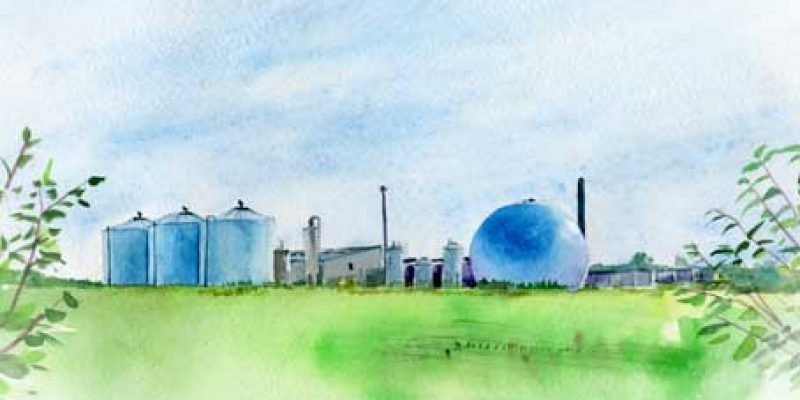By R.C.Wheater Sr.
Huge tanks and a concrete building are taking shape in the Fremont Industrial Park as the new Fremont Community Digester project prepares to start turning agricultural waste into electricity and fertilizer this summer.
The $22 million project, developed by Novi Energy, is expected to use a bacteria process to convert approximately 100,000 tons per year of agricultural waste into methane gas to be burned to generate electricity. The digester process is also expected to produce fertilizer and compost for west Michigan farms. It is said to be one of the first large-scale anaerobic digesters using co-digestion to be built in the United States.
Indus Energy, an investment group based in Bingham Farms, Mich., is the majority owner of the digester. North Central Cooperative, which includes the former Fremont Cooperative Produce, is a minority owner and will market the plant’s fertilizer and compost.
North Central Senior Manager Rob Zeldenrust of Fremont said that the digester is expected to start receiving the agricultural waste products in early July. He said that the digester already has contracts representing 80 percent of the digester’s capacity, with three other food processing companies currently in the contracting process.
Zeldenrust said that the digester will take in approximately 350 tons per day, a level that leaves room for some seasonal or short-term surges in the supply stream. He said that the combination of having an environmentally friendly waste destination and a local source of fertilizer has the potential of fueling local or regional growth in food processing and an accompanying growth in production and sales of west Michigan produce. He observed that such growth would also bring a growth in local jobs. U.S. Senator Debbie Stabenow and other federal, state and local government officials attended a ground-breaking ceremony in June at the site on Locust St.
Consumers Energy has agreed to buy all the electricity produced by the plant, which is expected to employ a total of eight full-time employees to operate the facility. The technology for the anaerobic digester comes from Denmark, and plans call for the digester’s local technicians to be trained in Denmark.
Zeldenrust said that the soil amendments and plant food produced by the digester will replace imported fertilizer products that are highly susceptible to oil price fluctuations and international uncertainties.
Zeldenrust noted that the Fremont Community Digester is expected to be the first of several such projects. He said that people are calling from other states and Canada to ask about the project and the possibility of building digester projects in other communities. He said that a second digester is being planned for a site elsewhere in Michigan, although the partners are not ready to reveal that location yet.
“We are ready to break ground on the second one,” Zeldenrust said, “but we’re not going to do that until we have this one up and running and we can demonstrate that this one is operating the way it’s supposed to. We want to wait until we know that we’re delivering on our promise to the community.”
Along with the electricity and the fertilizer products, the facility is also expected to produce some extra gas and some hot water that could be used by neighboring businesses. Zeldenrust said that those considerations are being used in the effort to attract other industrial or processing operations to the Fremont Industrial Park.
At the construction site, a stainless steel pre-treatment tank and one of three big digester tanks are in place, with construction crews also working on a concrete building that will house the electricity generating machinery and a steel frame building that will house a centrifuge for separating the fertilizer and plant food components.
NOVI Energy contact:
Aditya Gangadharan, 248.735.NOVI (6684) x 127, adganga@novienergy.com
